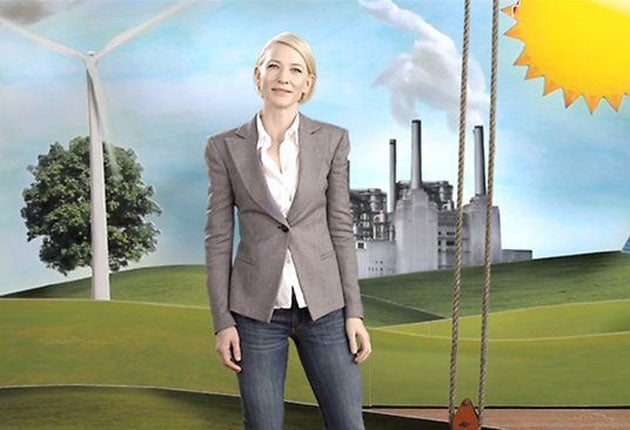Australia falls out of love with 'Carbon Cate' over starring role in tax advert

in the eyes of her fellow Australians, Cate Blanchett – Oscar-winning actor, theatre director and icon of female beauty – can usually do no wrong. Yesterday, though, she was branded "Carbon Cate" for taking part in a television advertising campaign promoting the virtues of a carbon tax.
Australia is embroiled in a bitter debate about the tax, which the Labor government plans to introduce by July next year. Critics, including the conservative opposition, claim it will lead to electricity, food and petrol price rises, causing hardship for families.
The campaign, funded by green groups and trade unions, urges people to "say yes" to the idea of taxing the major industrial polluters. As well as Blanchett, the star of such films as Notes on a Scandal and Elizabeth, it features another leading Australian actor, Michael Caton, and five members of the public.
But even before the first advertisement screened last night, Blanchett was criticised for taking part, with critics claiming that her wealth – estimated at A$53m (£34m) in 2009 – meant she was out of touch with ordinary Australians.
Terri Kelleher, of the Australian Families Association, told the Sydney Sunday Telegraph: "It's easy for her to advocate it. She's one of the people who can afford it." The newspaper itself dubbed her "Carbon Cate" and urged her to "stick to what she does best – acting". In an editorial, the paper said her stardom and wealth did not "qualify her to lecture Australian families ... on why such a [tax] is good for them".
A committed environmentalist, Blanchett has championed green issues in the past without much controversy. At the Sydney Theatre Company, where she and her husband, Andrew Upton, have been joint artistic directors for the past three years, they have installed rooftop solar panels and introduced rainwater harvesting and improved waste management and recycling.
Although Australians are among the world's worst per capita polluters, 60 per cent are opposed to a carbon tax, according to a poll published in The Australian earlier this month. Julia Gillard's minority government, which depends on the support of a Greens MP, Adam Bandt, wants the legislation introduced by September, and plans to introduce an emissions trading scheme within three to five years.
The television campaign – conceived and funded by organisations including Greenpeace, WWF and the Climate Institute, an independent research body – will be followed by national press advertisements signed by 140 celebrities, sporting figures, doctors and scientists, including the author Tim Winton and the artist Ken Done.
Blanchett, who won an Academy Award for her role in The Aviator, was defended yesterday by, among others, the Federal Treasurer, Wayne Swan.
John Connor, the chief executive of the Climate Institute, accused critics of mounting a "furious scare campaign". He said: "Australia is a high-polluting economy and we want to get the simple fact through that this approach would be one which started to make the big companies pay for their pollution."
Join our commenting forum
Join thought-provoking conversations, follow other Independent readers and see their replies
Comments
Bookmark popover
Removed from bookmarks